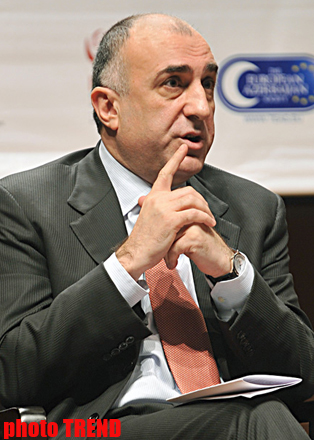Azerbaijan, Baku, Oct. 24 /Trend, E.Tariverdiyeva/
From the first day, Russia very harmoniously worked in order to extinguish the Nagorno-Karabakh conflict in the beginning, tries to find common points of contact, Azerbaijani Foreign Minister Elmar Mammadyarov said in an interview with Russian "Komsomolskaya Pravda" newspaper, published on Monday.
"We must pay tribute to the fact that Russia contributed to concluding ceasefire in Nagorno-Karabakh captured by Armenia," said the Minister.
Later, an institute of co-chairs was created, which included the French, Americans, Russians, detached from the Organization for Security and Cooperation in Europe, he said.
"There were a lot of options, we were very close to reach an agreement and move the issue from the deadlock which has been continuing since 1994, when the ceasefire was signed and accepted. We started the last step in Prague in 2004, and therefore, it was titled the Prague process. And its logic is step-by-step settlement," said Mammadyarov.
There were different ideas, why it was failure to come to a settlement, he said.
"Everyone understood that it needs to take symbiosis, realizing that it is necessary to firstly clean the negotiating table from the negative effects of armed conflict. And the negative part of the armed conflict is the occupation of territories and ethnic cleansing. Because everybody understands that not only Nagorno-Karabakh, but also areas outside Karabakh have been occupied!," said the Minister.
According to Mammadyarov, seven districts are a very heavy burden. Moreover, all these areas, including Karabakh itself, have been completely cleaned from the Azerbaijani population, he added.
"And in this context, when step-by-step appeared, we began to proceed from the fact that the withdrawal of Armenian forces from occupied territories around Karabakh would create a phenomenal opportunity for all other issues. But knowing that the Armenian side requests not to forget its problems over Karabakh's status, a form was devised, which was defined as the Madrid principles, since it began in Madrid, then in Athens. And they are, on the one hand, simple, and the other - the devil in the details," he said.
The first stage is the withdrawal of Armenian troops from the territories, Mammadyarov said. In parallel with this, the damage will be assessed, conditions will be created for the return of IDPs to their places of permanent residence, he added.
"An open communication is created for this: the opening of roads, restoration of railways. Because the fact-finding mission that visited the occupied territories at the request of the UN in accordance with the UN resolution submitted a detailed report that the situation there is deplorable. I must say that Armenian population was not in all seven districts that surround Karabakh. It is very important to restore the mutual relationship between the Armenian and Azerbaijani communities of Karabakh. The people should return to their homes in Nagorno-Karabakh, including Shusha, Khojaly, Khojavand. We are ready to help to build new houses and to fund this process," said the Minister.
Before coming to the final question of determining the status of Nagorno-Karabakh, it is first necessary that people who lived there could determine to be there, said Mammadyarov.
The Armenian side says that they have a problem of access to Karabakh, he said.
"We say - please, access is opened, communication is opened. This is one of the principles that were laid in Madrid. Then they say: we do not trust. And we also do not trust. Therefore, we have asked an international guarantee, international peacekeepers and observers. We are periodically accused: sniper was shot by the Azerbaijanis. I say that snipers do not appear from the air - they are there, where the Armenian troops are. If they withdraw from the occupied territories, who will be shot by snipers. Their snipers are shooting at our civilian population from the 11-year old boy or girl recently - again a civilian," the Minister said.
According to him, Vladimir Putin conducted meetings from the first moment, since 2004, when the Prague process started.
"I remember in Astana there was a long discussion between Vladimir Putin, Azerbaijani President Ilham Aliyev and the then Armenian President Robert Kocharyan. And three of them exchanged views extensively. Vladimir Putin is familiar with the subject, he directly owns the subject, and Russia is the co-chair of the Minsk Group, which works over the Karabakh problem. Based on the position that Russia was, is and will be our neighbor in the Caucasus, the God itself ordered to create a predictable development that we could find common points of contact. We are against the first and the main question today - the presence of the Armenian armed forces in the territory of Azerbaijan, around occupied territories of Nagorno-Karabakh. Much will change as soon as the troops withdraw," said the Minister.
The conflict between the two South Caucasus countries began in 1988 when Armenia made territorial claims against Azerbaijan. Armenian armed forces have occupied 20 percent of Azerbaijan since 1992, including the Nagorno-Karabakh region and 7 surrounding districts.
Azerbaijan and Armenia signed a ceasefire agreement in 1994. The co-chairs of the OSCE Minsk Group - Russia, France, and the U.S. - are currently holding the peace negotiations.
Armenia has not yet implemented the U.N. Security Council's four resolutions on the liberation of the Nagorno-Karabakh and the surrounding regions.






